From Dunoon to Greece - Scottish sailor Susan Smillie travelled 1,500 miles solo on a voyage of discovery
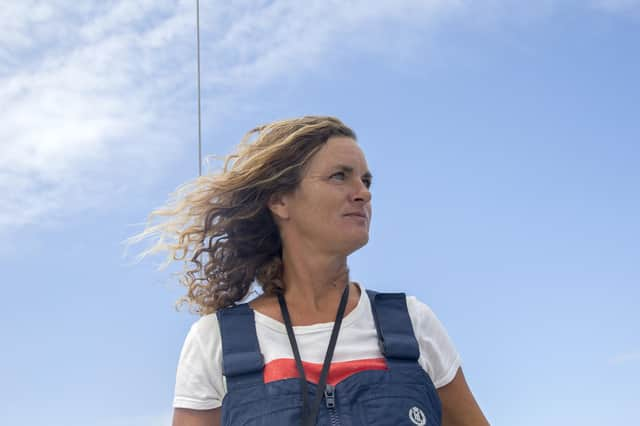

Have you ever dreamed of swapping your daily commute and hours in the office for something completely different? Scottish sailor Susan Smillie did just that, taking redundancy from her job as food editor at The Guardian in London and setting off on her boat Isean to sail alone on a journey that took her all the way from the south coast of England to Greece, an experience she’s captured on the pages of her remarkable book The Half Bird - ‘one woman’s brave and unexpected journey to freedom’.
Swapping a life of ‘obligations and bills and the daily commute’ and the companionship of colleagues and friends for gannets seals and crabs, when Smillie set off in 2017 she hadn’t planned to sail the 1,500 or so miles to the Ambracian Gulf in Greece where she is right now.
“Far further than I ever imagined I would go,” she says, with an understatement belied by the adventures she recounts in the book as she encounters the storms and struggles of sailing alone across The Channel, down the Atlantic coast of Portugal and Spain with its mighty rolling seas and into the capricious Mediterranean, as well as the kindness and challenges of the people she meets.
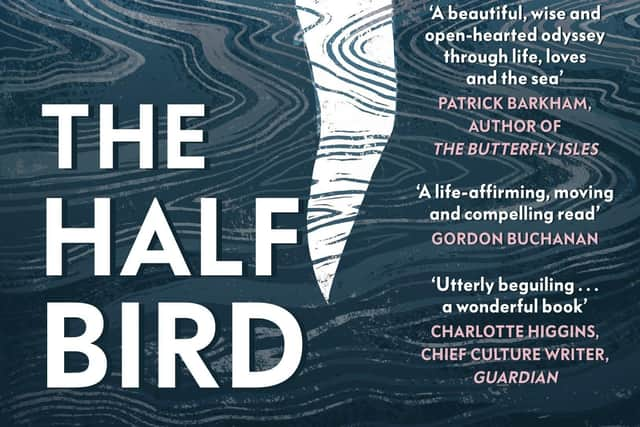

A weekend sailor after restoring the boat, a Nicholson 26 found rusting in a boatyard on the West Coast of Scotland in 2014, she had sailed at weekends on the south coast but when redundancy arrived she planned to sail around the British coastline, visiting her father in Dunoon then onwards. But with winter setting in, Isean, named for the Gaelic word for chick or little bird, had other plans and when she turned her bow south instead of north, Smillie went with her.
“It’s like the boat is half boat half bird and at times it felt like I was half me and half boat. We were together flying.”
But what was it that made her head south instead of north, then just keep going?
“I just went off and did it so quickly. It was quite spontaneous. I was on a real high, especially that first bit sailing across the Channel to France then going down the Atlantic. I was like ‘wow I’m in France, oh my god I’m in Spain, I’m in Portugal’ and I just kept going, day after day.”
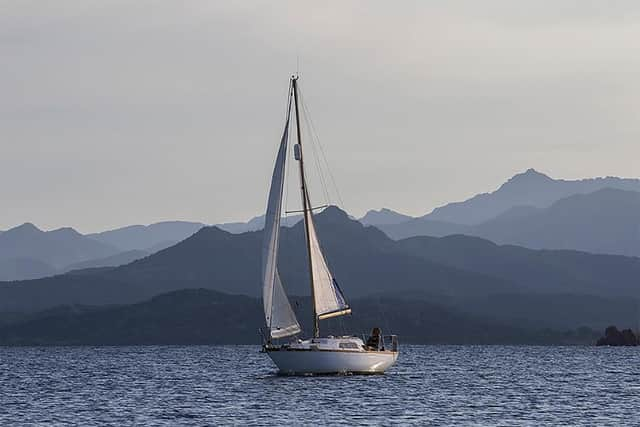

Today she’s in a boatyard in the Ambracian Gulf, an inland sea where wildlife flourishes and 52-year-old Smillie is content to stay awhile as her boat is worked on, and she visits the UK to see family and promotes the book.
“I’ve just been swimming in front of the jetty where there are seahorses so I’m happy. It’s beautiful here. There are flamingos a couple of hundred metres that way, there are dolphins in the bay all the time, and because it’s not got that crystal clear water everyone wants, it’s quiet, a real paradise. I go swimming every day. There are almond and fig trees so I gather food and I’m doing a bit of writing.”
Smillie’s not one for planning, having got here without a plan or a declaration of intent, and that’s the way she likes it. After leaving Dumbarton at 19 for a job in a bank in London, she moved to work in the arts in Brighton before studying journalism and landing a job at The Guardian where she ultimately worked as food editor, while living on a boat in the Thames.
“I loved London and my job and life there and it was all I’d ever wanted, until I was on the sea and nothing could be better. I guess it’s just my element. I really feel the need to be in the water and swimming all the time.”
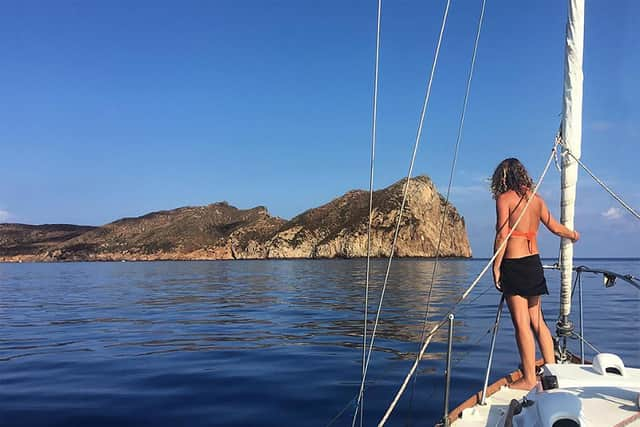

“I think it became quite addictive. It was just so good. I felt very resentful about having to go back to work after a weekend sailing. I’d be in the office thinking, this is really unreasonable that I have to be here rather than sitting on my boat watching seals. Why am I doing this?”
Then life intervened when she was in her late forties and hit with a brain haemorrhage and redundancy, and suddenly sailing stopped being a weekend pastime and became a way of life. Once she’d given up her London life and set sail, there was no turning back.
“It was this crazy mix of excitement and fear and that thing of when you start to do something you’ve always wanted to do. Just being at sea was the biggest adventure but also a comfort, being on my boat and in the wild, with everything I wanted with me. It was such an addictive thing.”
“At the start I would have been amazed to think I could take the boat out by myself, never mind sail across the channel to France or end up in Greece. You remember your previous self that was too scared to leave Brighton Marina and think yeah, that’s quite a lot actually, it’s quite good what I’ve done.”
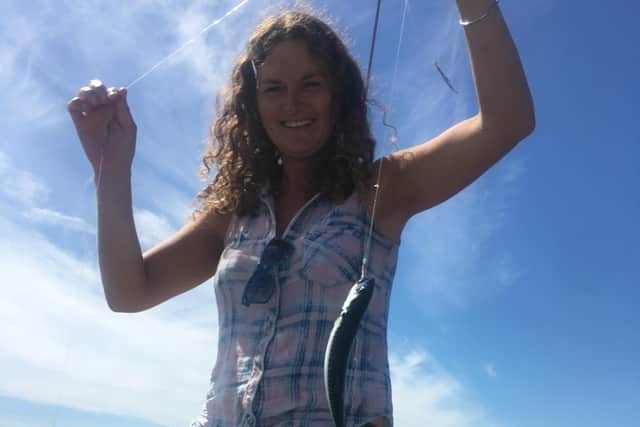

As she sailed along the coasts of France, Portugal, Spain, Mallorca, Sardinia, Corsica, Italy, and Greece and islands in between, she stopped off in many places and every now and then would feel the lure of the land. Her book is peppered with the people and places she encounters - the couple who feed her in northern France and gift her a pair of slippers, or the villagers on San Pietro island off Sardinia, ‘some of the happiest people I’ve ever seen anywhere’, although it pays to be prudent as a gift of a bucket of oysters from a fisherman can amount to a marriage proposal as Smillie discovers.
Why did she never give in to the temptation to settle in any of these welcoming communities?
“Because I always wanted to be with the boat and keep going. It was the adventure, me and Isean. I wanted to be back with her, doing our thing. I was so addicted to the journey with her, I didn’t want to stop.”
Sailing alone on open seas is not for the faint hearted and Smillie encountered real fear when she moved into the choppy, unpredictable waters of The Mediterranean, a sea very different from the package holidays experience, ravaged by winds ferocious enough to warrant names: levant, poniente, sirocco, mistral, tramontane, bora, meltemi.
“The book opens with us in a storm near Malaga,” says Smillie. “That was terrifying and my own fault. It was Isean and me swerving around in the wind and waves, tipped right over, with no life jacket and me hanging on. I remember screaming because we were really out of control and that was scary. The Med is very unpredictable and quickly turns into a maelstrom of very steep, heavy waves. There have been a few scary times actually.”
Ironically Smillie often felt safer alone at sea on the boat than moored, around humans who found a lone woman sailor a challenge or threat.
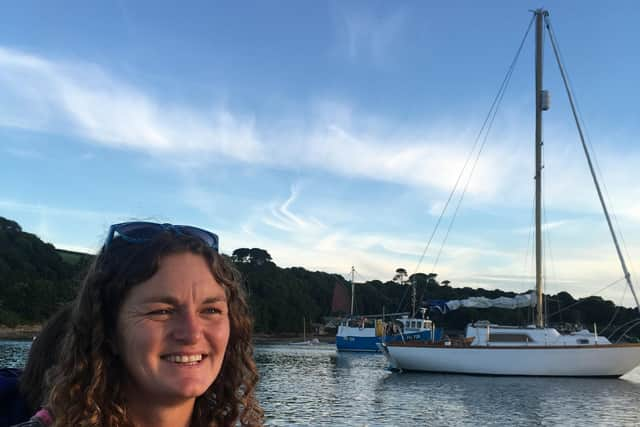

“It wasn’t the sea, although I was scared in the storms, but some of the most dangerous situations are the ones with humans. They found me inexplicable as a woman alone. They were suspicious and thought why is a woman on her own at sea? It can’t be for pleasure so she’s trafficking or something.”
What was the most frightening thing that happened on her journey?
“There was a situation with the coastguards in Greece. A young guy who had a boat near me had got himself into trouble and the coastguard came out and had him at gunpoint. I went out in my little dingy and was just trying to calm things down and they let me onto the boat to help so they were pointing the gun at me as well. There was so much shouting and hysteria, out there in the dark with these guns and guys; that was the most scary.”
Another tense scenario for Smillie was her encounter with migrants in The Mediterranean.
“That started off scary then ended up more sad. It was a human situation. A mayday came through from friends and I turned the boat towards them because that’s what you do if lives are at risk. The call had come in, ‘We’re being followed, we’ve been boarded’, and the next call was ‘man overboard’ so that was frightening on the way there but in the end it was actually a really sad situation. The guys had been desperate, on a boat for five days and looking for help and had crashed into my friends’ boat and boarded. We got the coastguard five hours later, and it was sad, but at first it was very tense.”
For Smillie the frightening times on the boat are far outweighed by the happy times and the exhilaration she felt at the freedom, happy to forgo fine dining for cooking on a tiny stove in her cabin.
“When you’re 20 nautical miles from the nearest bakery you find you can make flat bread really easily and I was getting fish from fishermen and experimenting with salting it and I made yoghurt. I didn’t miss fancy restaurant meals. I would quite often have potatoes and a tin of tuna.”.
What were the happiest times on the boat?
“Always the wildlife, the dolphins. They swim at the bow with you, riding the momentum of the wave. I think it’s curiosity and the thrill of the ride for them. All the way from England down to Portugal I had dolphins and it’s such an amazing thing when they turn on their side and look at you and make eye contact through the water; it’s my favourite thing ever.”
“Before the journey one time I took my friends for a sunset sail just off Dartmouth and dolphins appeared everywhere around us, a super pod of hundreds, if not thousands, of dolphins everywhere as far as the eye could see. I almost felt like I must be hallucinating because it was this incredible show. It was so exciting and then moving. I said: ‘Do you think we’ve all died?’, because it was so surreal, the boat sailing into the sunset and the three of us sitting with the dolphins. It was crazy.”
After reaching Greece, Smillie returned to Scotland in 2022 to visit her father in Dunoon and settled down to writing a record of her journey, while still swimming every day, out to the seals at the Gantocks Lighthouse offshore. Being in Scotland injected an element of family into The Half Bird, which is a wonderful combination of themes. Along with the story of the voyage, there’s also self-discovery mixed up with reflections on the death of her brother Stephen as a young adult in a car crash and the loss of her mother Katy, and family looms large, not least her grandmother on Mull and grandfather Edgar, a welder who worked on the PS Waverley, the world’s last paddle steamer to take passengers to sea.
“Writing the book at my dad’s brought all the family stuff into it, which is a good thing. I didn’t really want to write a sailing book, I wanted to write something a bit different. And a book is a really lovely thing to have for when I’m a lot older, to think ‘oh yeah. remember that time I just went off and sailed to Greece.’
Also a big presence in the book is the boat, Isean, who at times is given a voice, commenting on its sailor and their journey together.
“She is a character and I want her voice in it,” says Smillie. “In some ways she felt like a child when we first had her, then a sister, then her voice is very like my gran, who was quite critical, and it changes to be like my mum’s. I just really wanted her in there.”
Being back in Scotland also saw Smillie rediscover what was on the doorstep that she had left as a teenager.
“All of these amazing adventures on the boat, one thing I never appreciated growing up in Scotland was how much wildlife there is around the UK. When I was a child we’d get the Calmac Ferries up to Mull and I’d be excited about macaroni and cheese and chips and if I had known there were orcas and sharks and the abundance of wildlife we have in Scottish waters, it would have blown my mind.
“I thought this amazing journey I had was so special, but everywhere is special. Every day I swam out to the Gantick Lighthouse and there were seals and this incredible wildlife. Things I thought were far away exotic are right there. It’s actually about looking. There are seahorses and seals in the Thames, there was an orca in the Clyde. There are amazing things all around and we need to stop and look and appreciate. There’s so much beauty everywhere.”
The question colleagues asked when Smillie said she was leaving work to go sailing was always ‘What next?’ and it’s one I put to her now.
“I don’t know because I’m not good at planning. I’m happy with the situation I’ve got now. I can go and spend time with my dad and have my boat here in a beautiful place - she needs some care because she’s been sailing hard. There’s the book and then… I don’t know.
“I do know I’ll launch Isean again. I’ve found a place where maybe I’ve got a more of a base, but that doesn’t mean I won’t go off on another big adventure. None of us ever know what’s going to happen. I would never have imagined any of this. But I definitely want to sail to Africa. Maybe that’s the one thing I can say for sure that I will do. And I don’t know if I would want to do an Atlantic crossing on Isean. Maybe…”
The Half Bird by Susan Smillie, Published 21 March 2024, Hardback £16.99, Penguin Michael Joseph